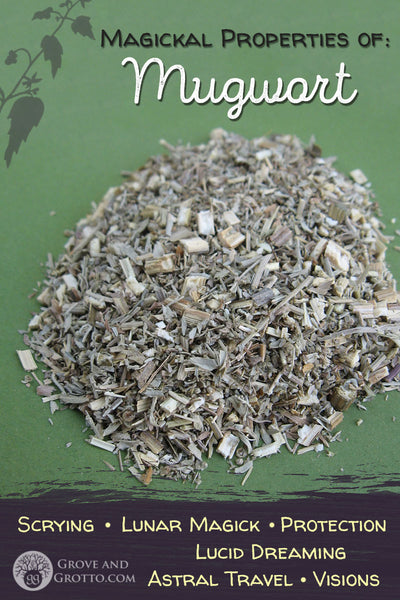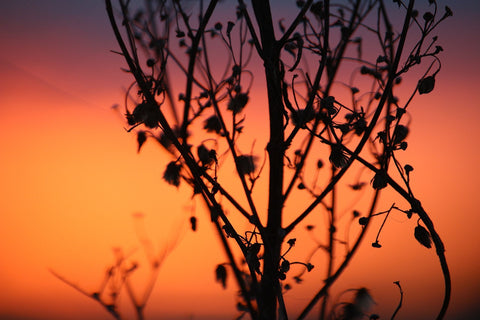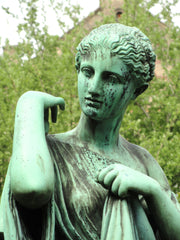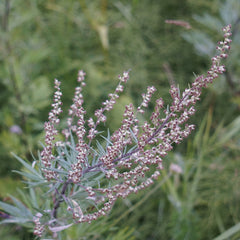Magickal properties of Mugwort
Posted by Michelle Gruben on

Mugwort is one of the most popular herbs for the Witch’s pantry. It’s known as a psychic/Lunar herb that’s also strongly protective. This article describes Artemisia vulgaris, common Mugwort.
Mugwort’s magickal virtues (combined with its low cost) make it our best-selling loose herb. But how did this unassuming ditch-weed become the Witch Queen of the herb aisle? It started as long ago as the Iron Age, when early farmers gathered wild plants to fancy up their bland, grain-based diets. Certain plants became favored for their ability to prevent spoilage and repel insects—a seemingly magickal power.
Almost every beer made today contains aromatic herbs known as hops. But before brewers in Britain and Europe discovered hops, Mugwort helped keep the beer fresh and provided the crucial bitter note. (Some people say the “mug” part of the plant’s name comes from its brewing history. But a more likely etymology is the Old Norse muggi, meaning marsh.) Mugwort was also used in medieval cooking to flavor fish and game dishes. Currently, Mugwort’s culinary uses have been completely overshadowed by its cousin Wormwood, the notorious herbal ingredient in absinthe.
Mugwort grows abundantly in ditches and rocky soils. Mugwort has a sharp, bitter flavor and antimicrobial properties. In European folklore, Mugwort protects against fatigue, injury, and poisons. The Romans were said to put a sprig of Mugwort in their shoes to avoid tiring. Mugwort is mentioned in the Nine Herbs Charm, a 10th-century English rhyme of beneficial herbs. Later, it was associated with St. John the Baptist, and wreaths of Mugwort were worn to repel evil spirits.
As a folk medicine, Mugwort was ingested, smoked, or applied to the skin in a poultice. Mugwort has anticoagulant and disinfectant properties, and has a nerve-calming effect. It was used as a poor man’s substitute for expensive tobacco, giving rise to the nickname “sailor’s tobacco.”
Mugwort contains the chemical thujone, which is a mild intoxicant. (However, it’s a mystery whether medieval people would have noticed the effects of thujone, considering the amount of beer they drank!) Not many people have a taste for Mugwort brews these days. If you’re curious to try it, look for heritage recipes sold as “gruit beer” or “gruit ale.”
Magickal Uses of Mugwort

In modern witchcraft, Mugwort is used primarily as a visionary herb. Mugwort amplifies psychic vision and may induce prophetic dreams. An herb of the Goddess as Crone, Mugwort encourages wisdom and observation. When paired with a divinatory method of your choice, Mugwort is an excellent helper for confronting difficult truths.
Mugwort appears in recipes for flying ointments, psychic teas, and divinatory incenses. Different people report vastly different experiences with using Mugwort. Thanks to internet drug culture, Mugwort became known as a “legal high,” prompting the state of Louisiana to ban possession and sale in 2005.
Mugwort is not really a hallucinogen, but a way to stimulate lucid dreaming, astral travel, and visualization. The effects of Mugwort are more pronounced during sleep or trance states. But Mugwort does have real psychoactive effects. If you are very sensitive to thujone, remember that it can be absorbed transdermally (through the skin). I once found this out the hard way, when packaging up a pound of Mugwort for the shop.
Witches may buy Mugwort dried (in occult and herb shops) or occasionally, fresh (in gourmet grocery stores). Alcoholic tinctures and essential oils are also available. Mugwort grows wild in many places. Be sure to get a positive ID—Mugwort looks a lot like Ragweed, a most un-magickal plant.
Mugwort has a hay-like, herbal smell reminiscent of dried Sage and Chrysanthemum. When smoked, it has a tolerable aroma, but Mugwort tea is quite bitter to most people.
Correspondences of Mugwort

Mugwort is a member of the genus Artemisia, a group of plants named for the Greek Goddess of the moon. If that’s not evidence enough for a Lunar attribution, I don’t know what is. Mugwort also excels in the Lunar realm of divination and dreams. But occasionally someone makes an argument for Venus, the ruler of many healing herbs.
This plain-looking, low-growing plant corresponds to the element of Earth.
Spells and Formulas with Mugwort

Hang a bundle near the front door to prevent evil from entering. Hung near the bed, Mugwort is said to aid in astral projection.
Sleeping on a pillow or sachet stuffed with Mugwort (with Jasmine, Rose and/or Lavender) brings clear and memorable dreams.
Burn Mugwort over charcoal as a divinatory and purifying incense. Mugwort is sometimes tied into bundles to make smudges. (It repels insects, too!)
Mugwort may be prepared as an herb tea to aid in divination and scrying. A teaspoon of the dried leaves is steeped in one cup of hot water. Add honey and lemon, or combine with other herbs, if desired.
From Scott Cunningham: “The infusion is also used to wash crystal balls and magic mirrors, and mugwort leaves are placed around the base of the ball (or beneath it) to aid in psychic workings.”
Kindle magickal fires with Mugwort branches and stems.
Mugwort may be incorporated into protective spells and charms. Gather Mugwort sprigs on St. John’s Eve (June 23) for protection throughout the year.
Precautions
Mugwort is not suitable for pregnant or lactating women.
Artemisia plants contain liver toxins that may build up if used in excess. If you use them regularly, take periodic breaks of at least a week. Don’t give them to young children or pets.
Never ingest essential oils. That goes double for oils containing thujone. A single overdose can cause permanent damage to the liver and kidneys.
Mugwort produces pollen which may aggravate seasonal allergies. The pollen is not a big problem if you plan to burn it or brew it in water. However, it’s something to think about when making dream pillows and wreaths. Some people have reported skin irritation from contact with the herb.
While I don’t know if it’s possible to have a “bad trip” on Mugwort, those opposed to mind-altering substances should probably avoid it.
Scent Profile: Herbaceous, Sharp, Grassy, Musty
Correspondences: Moon/Venus, Earth
Occult properties of herbs are provided for historical interest only, and no outcome is guaranteed. Nothing on this website should be taken as medical or legal advice. Please use herbs responsibly.
Search our shop for Mugwort products, or browse more articles.
Share this post
- Tags: 2017, herbs, materials, psychic development
